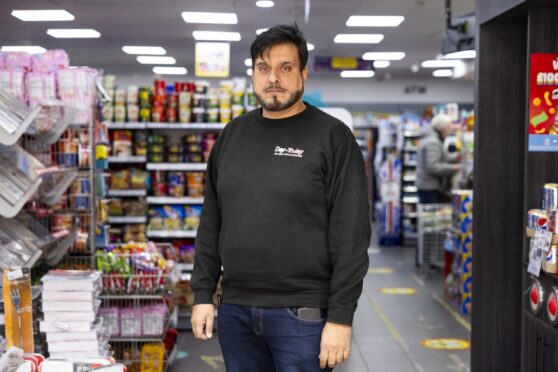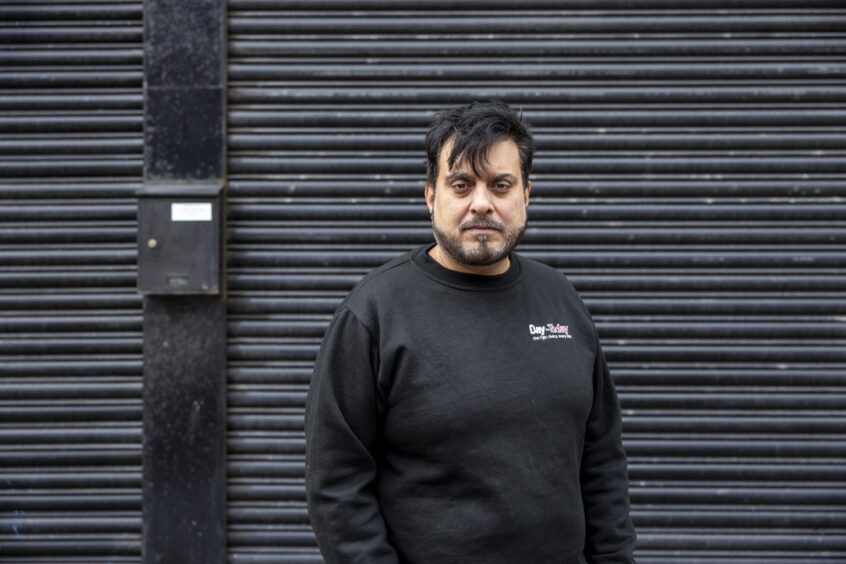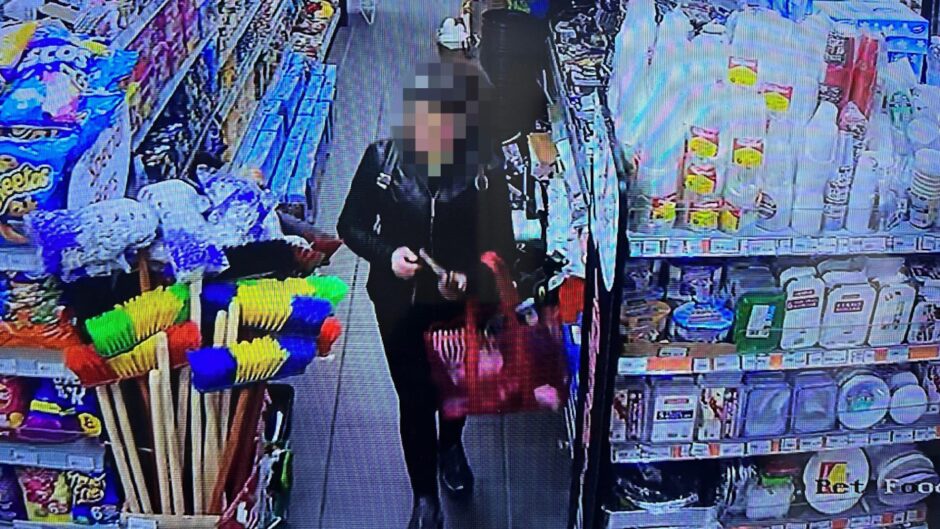
Shopkeepers are calling for urgent action on soaring incidents of shoplifting across Scotland as new figures reveal a worse start to the year than the already record levels of theft reported in 2023.
The unprecedented crime wave cost the country’s more than 5,000 convenience stores a staggering £62.9 million last year – an average of £12,164 per outlet.
Now, Stirling-based organisation Retailers Against Crime (RAC) – which represents 1,500 businesses – is reporting that shop owners experienced a horrendous past three months, with losses to theft among its members alone already up by 25% and now topping £160,000 a month.
“We didn’t think that things could get much worse than they already have been, but shoplifting and the violence and abuse towards staff that often comes with it is now at epidemic levels,” said Stephanie Karte, RAC’s national operations manager. “In March alone, losses to shops jumped by a quarter on February’s already alarming figures.
“This situation has to be urgently brought under control because it is only a matter of time before someone is killed during one of these incidents, some of which are becoming increasingly violent.”
Shoplifting a daily occurrence
A recent survey by the Scottish Grocers’ Federation showed that all of Scotland’s convenience retailers agree that shoplifting had increased, with almost all stating it was now a daily occurrence.
More than nine out of every 10 stores are also reporting weekly incidents of violence against staff, with hate crimes occurring monthly.
And more than half of shopkeepers say they are experiencing daily abuse when refusing a sale or asking for proof of age.
The cost-of-living crisis and an increase in organised criminal gang activity have been blamed for a rise in shoplifting across the country. Viral TikTok videos have also sparked concerns by giving advice on how to steal.
Last year there was a 37% hike in reported shoplifting incidents in Scotland compared to 2022, up from 26,835 to 36,815 crimes. That figure is certain to soar even higher this year, Karte said. “Part of the problem is that some people seem to regard shoplifting as a victimless crime against big businesses that can afford to absorb it. The truth is very different, with many shop owners suffering heavy financial losses and staff being put in danger on a daily basis.
“No items are off-limits for the organised groups and individuals responsible. Our members report whole shelves of goods being cleared out and other cases where the perpetrators are stealing to order.”
High-value and restricted products, such as alcohol and tobacco, will regularly be a target for thieves.
But, increasingly, everyday items such as clothes, toiletries, food and cleaning products are being stolen.
Karte said she believed tougher sentences as well as better support for victims must be introduced before the situation escalates further.
RAC has also called for lessons to discourage shoplifting to be introduced in every primary school to combat the growing crime wave.
Shoplifting as a ‘last resort’
Paisley-based charity the Star Project – which works to tackle poverty and deprivation – said it was “no surprise” that some people were turning to theft to feed their family, given the state of their personal finances.
Manager Heather Kay said: “In the past two years the number of people coming to us for help has quadrupled to more than 8,000 and an incredible amount of them simply can’t afford to pay their continually rising household bills.
“It is no wonder that some are turning to shoplifting for essential items.
“And it is not just people struggling to get on benefits who feel forced into this.
“Even people who are working in low-paid jobs are turning to shoplifting as a last resort because they can’t see any other way out of the situation.”
Many of those caught shoplifting by police last year – more than 7,500 – escaped prosecution and were issued with a Recorded Police Warning instead.
Police Scotland, however, insisted it was working closely with the retail and business sectors to deter, prevent and investigate retail crime.
It said: “Where we identify businesses that are being targeted by shoplifters, we have trained officers who can attend and carry out security surveys and offer advice around prevention.
“We would encourage those employed within the retail sector to come forward and report any criminal activity directed towards them. We will investigate all reported crimes, with every case fully assessed and given a proportionate response based on threat, harm and risk.”
The Scottish Government said it condemned any violence against retail workers and would encourage retailers to report all crimes to the police.
It added: “The Scottish Partnership Against Acquisitive Crime Strategy is a partnership led by Police Scotland working with retailers and other organisations, including Retailers Against Crime. It seeks to minimise opportunities for this type of crime, protect individuals and businesses, and deliver clear guidance for prevention.”
I caught one boy stealing vapes. The police told me to let him go because he might have a knife
It’s 6.35pm on the first Tuesday of this month. Mohammed Rajak is getting ready to finish his shift when a young woman with a red jacket and ponytail appears at the till next to her male companion. The woman is known to Mohammed and his staff for shoplifting.
The man is paying for his items when the woman suddenly snatches a packet of Maltesers from the counter. Mohammed asks her to put them back, at which point the man he had been serving takes offence and starts shouting and swearing at him.
Both are asked to leave, then Mohammed is called a “goon” and is asked for a fight outside.
Police are contacted and the incident is logged as a hate crime under Scotland’s new law.
Sadly, this isn’t the first time Mohammed and his staff at the Buywell DayToday convenience store in Dalmarnock Road, Bridgeton, have been faced with shoplifting.
In the past year, the shop, sandwiched between two Chinese food outlets in a nondescript street of similar convenience stores, takeaways and tanning salons, has faced about a dozen shoplifting incidents a week. It is the worst Mohammed has ever seen, and a constant headache for him, putting him and his staff at risk of violence and verbal abuse, and costing the business hundreds of pounds. Only a few are caught and prosecuted.
Mohammed, a softly spoken middle-aged man with a friendly manner, says: “It’s been terrible this year.
“It’s across the range – from children to mum’s to immigrants to locals to addicts. It doesn’t matter who it is.
“It used to be certain products like Nescafe packs and stuff like that because you can buy that and sell it in the pubs, but the pubs are in a decline as well, so the people who are stealing that stuff to take and then sell in pubs find there aren’t any customers there.
“So they are just stealing for their own purposes now and that’s worse because you don’t know what your target options are. Anything can be a target and that’s the issues we’ve been having. I’ve been here 34 years and I’ve never seen it so bad this year.”
The thefts are relatively small. There was the man who stole two cans of WKD alcopop, slipping them in his pocket before walking out. Or the two girls who, after school on Thursday, popped in to take cans of Red Bull and chocolate, along with a ready-made Starbucks drink.
Mohammed acknowledges that, with inflation pushing prices up, some people may be stealing to feed themselves. But he also identifies another problem.
“I think it’s cost of living, but I also think it’s the police – it’s their attitude towards petty crime,” he said.
“I had one two weeks ago and it was a young boy, and he was stealing vapes and I caught him, got the vapes back off him and phoned the police there and then. And when I was on the phone to 999, they said he might have a knife let him go.
“So they came in and I said we’ve got CCTV footage and we’ll see what we can do, they came back 10 days later and said he’s not known to anyone and that’s the case closed.
“I would have lost my stuff, worried about if my staff had got injured and the police basically can’t be bothered chasing up the guy. They’ve actually closed the case.”
“We were saying we could be losing as much as £100 a day. We can see up to at least a dozen shoplifts in a week.
“It’s crazy and these are the ones we are catching on CCTV. What about the ones we’re not catching?
“There was one that was so discreet, we didn’t realise he had done it until we had checked the camera. I’ve never seen it as bad. It’s very rare they get to court, but I do have one coming up. The woman is known to the area and so I’m going to have to get a staff member to look after my shift for the whole day.
“Because I’m a manager it’s going to cost me a manager’s wage, not just a normal person’s wage.”
Expert view
By Dr Pete Cheema OBE, Chief executive of the Scottish Grocers’ Federation
Convenience retailers are at the very heart of their communities, and many are on a first-name basis with the customers they serve.
However, there is a real danger that shop theft is becoming normalised in stores across Scotland.
In reality, shop theft frequently takes place alongside threatening abuse and potentially violent behaviour – especially if the retailer is forced to challenge the individual responsible.
This significantly impacts the wellbeing of both retailers and their staff and has a harmful effect on business viability.
Convenience stores in Scotland are often small independent businesses, and retailers often work alone or in a very small team, sometimes during unsocial hours.
The damaging impact of crime puts the future of the local services offered by stores at risk, fuels criminal activity on a wider scale and ultimately increases costs for other customers, many of whom are also struggling with their own household budgets.
While it’s not always clear why people decide to commit these crimes, the fact that our justice system in Scotland is stretched to breaking point means that many criminals believe that there will be no consequences for their actions.
More than nine out of every 10 stores also report that violence against staff occurs at least once a week.
From machete and knife attacks to organised gangs roving through communities targeting vulnerable businesses to loot, it’s understandable that some members of staff are now refusing to come to work for fear of their safety.
Our members have told us that police response times are now delayed to the degree it undermines reporting the crime and the waiting times for court can be up to four years.
That is why we have repeatedly called on the Scottish Government to implement an emergency strategy, with dedicated resources, to get to grips with this growing problem.

Enjoy the convenience of having The Sunday Post delivered as a digital ePaper straight to your smartphone, tablet or computer.
Subscribe for only £5.49 a month and enjoy all the benefits of the printed paper as a digital replica.
Subscribe © Jamie Williamson
© Jamie Williamson
 © SYSTEM
© SYSTEM